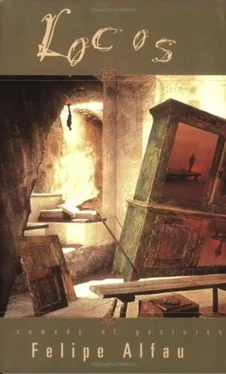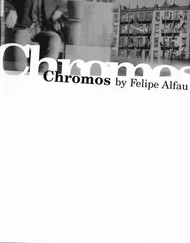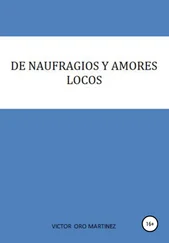Strange to say, I remember the scene that followed as clearly as if it were only yesterday.
I remember that we followed Padre Inocencio to the convent and that we spoke of our studies, but that I knew that my friends were thinking of the same thing I was thinking and that they were possessed of the same curiosity.
I remember that there were two nuns in front of the convent building and that we all said good afternoon to them. And then Padre Inocencio entered the building alone and we were left to wait outside.
While we waited no one of us dared speak first. Such was our expectation that we forgot all about Cavañitas’s tale concerning Padre Mora.
I remember that then we saw Padre Inocencio reappear and he was accompanied by a nun. They were walking slowly toward us and they were holding a lively conversation. She talked and laughed cheerfully, moving her hands, acting in a way in which we had seen no other nun act. Padre Inocencio walked beside her, one hand behind and the other playing with the crucifix that hung on his breast, smiling thoughtfully. And I knew that they were not talking about us, that they were talking and thinking of something far more important than we were.
They formed a group so worldly, she was so fresh, so graceful and gay. Padre Inocencio walked with such ease and elegance, with such attentiveness and such a gallant manner, that my thoughts instantly reverted to a young man and young woman whom I had seen once in Madrid in El Retiro, walking oblivious of everything, in the same style.
And I knew that they were not talking about us, that they were talking and thinking of something far more important than we were. Only once as they approached, she looked, smiled, winked and waved her hand at us. And even then in my incipient masculinity, I felt that it was a feminine concession that she was not like other nuns. When they reached the spot where we stood, Padre Inocencio seemed to wake from a dream.
“Here you have the rascals.”
And then we saw that. yes, that woman. Her mouth was fresh, with a faint tendency to thickness, her eyes slightly tilted upwards and very black and very bright, and her complexion olive. She seemed very young to be a nun. She was so friendly, her whole body emanated such familiarity, so much informal comradeship, that I thought in her case the name sister very adequate, as the other nuns had always struck me more as a mother-in-law. I told her this once some time after and she laughed, nodded in agreement and called me naughty, giving me a big hug. And then she asked me what I knew about mothers-in-law.
Cavañitas stooped to kiss the edge of her habit, but she held him by the shoulders and kissed him squarely on the mouth. I saw him blush and felt my heart beat quickly. Then she did the same thing with Alfau and myself and then turned to Padre Inocencio and said:
“Nothing for you today.”
Padre Inocencio was laughing delightedly. We followed his example, not knowing what else to do in our embarrassment. She spoke quickly and of many things: she spoke of her brother, of the things that Pepito had told her about us, and in the end our embarrassment vanished. We knew we had another friend.
I remember everything as if it were yesterday. I noticed the pleasant smell of cleanliness that came from her, her plumpish hands, her finely polished nails. Decidedly she was not like other nuns.
I remember when she laid her hand on my shoulder and looked at me with mocking seriousness and said I was a little pale. And then she said that she was going to teach us the catechism and told us that she expected us there every Thursday after lunch. And after she had arranged everything she asked Padre Inocencio for his permission.
And, of course, he gave his permission.
When I returned to my classes, I knew I had another friend. Yes, aside from Cavañitas and Alfau, Padre Inocencio and Sister Carmela were my only two friends, the only pleasant things. And I associated that man and that woman intimately, too intimately. They were both exceptional in the Church. Although Padre Inocencio was much older, he had gray hair already, they were both so unusual in that environment, that they became identified in my thoughts. Up to this day I cannot think of one without thinking of the other. But now I know that they were different. Fundamentally, radically different, like a glass of water and a glass of wine.
This second year was not perhaps as bad as the first and Padre Inocencio and Sister Carmela contributed no little to make it more bearable. The lessons with her were one of the sweetest things during that year. All week long we looked forward to them. I remember some of those lessons. I remember when we went over the Ten Commandments and the seven mortal sins. I remember those lessons and that we questioned ourselves, why did she dwell so long upon certain descriptions which were embarrassing to us in her presence? I remember that there was a spark of mischief in her tilted eyes as she dwelt at length upon the sixth commandment and asked us subtle questions one by one. I remember how she dwelt upon those descriptions and that although we did not say so to each other, we liked her much better for it.
I remember how she would offer a big kiss to the one who knew the lesson best and every time she decided that we all knew it just as well. And I remember the day that I stayed after class and she sat beside me and put her arm about my neck. She asked me if I ever thought about sweethearts. Then she was about to ask me something else and Padre Inocencio entered the room and she changed abruptly:
“Padre Inocencio, my greatest trouble is that I like children too much.”
Her voice was calm and even, only her breast was undulating quickly. And now I ask myself: was that sheer cynicism, or did she mean it in some other way?
Padre Inocencio looked at her with profound admiration and said:
“If that is a trouble, that is my trouble, too.”
But there has never been the slightest doubt in my mind as to the meaning of his words. And that day for the first time that man and that woman gave me two different impressions.
Slowly she bored deeply through our hearts. She aroused things in us that were new, she woke new sentiments in us. Like a sweet breeze she blew upon the fire of our imagination and the feelings we entertained toward her were of the strangest and most confused nature. She aroused jealousy in us, she aroused too many things.
Did she delight in playing with children? Did it afford her pleasure to awaken our youthful hearts? Was it wickedness or was it just a weakness? Did what she guessed in us flatter her? The passion of a child must be quite flattering. I know that it must be the sweetest thing.
But was it really so? Perhaps we only imagined it. I have already explained myself. We were so overwrought, we slept so little, we worked so hard, we feared so much, we felt so persecuted. Our minds did not work properly. I think in that school we were all lunatics, we were neurotics. In short, we were the students, a bunch of emaciated nervous wrecks.
In describing Sister Carmela’s character I prefer not to quote the older people who knew of her. She may have harmed others, but she was good to me and to my friends. Besides, I have always felt that she placed a tacit confidence in us. Sometimes walking with us, she spoke of things that she asked us never to repeat. And yet she always liked to make every individual believe that he was the only one in her thoughts. She was not always sincere and I don’t know. I don’t know. But anyway I can only speak of what I remember happening.
And such was her character to the best of my knowledge:
Sister Carmela was an exceptional nun.
She was enormously attractive.
She was always friendly and gay.
She always wanted to arouse everyone.
Читать дальше












